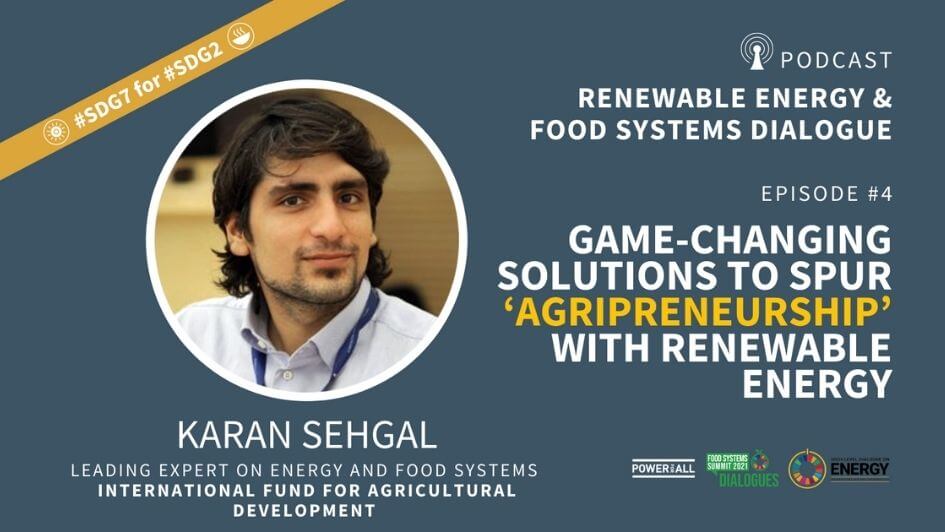In this episode of the Power for All podcast, William Brent speaks with Karan Sehgal, leading expert on Energy and Food Systems at the International Fund for Agricultural Development (IFAD).In support of this year’s UN Food Systems Summit, this podcast is part of a special series focused on the critical link between food systems and decentralized renewable energy, aimed at highlighting game-changing ideas in Africa and Asia that can help ensure sustainable energy for all and improve farmers’ lives.
The IFAD is a specialized UN Agency that also acts as an IFI (International Financial Institution)
Apart from providing financial assistance to small-holder farmers, Karan explains that IFAD works on systematically incorporating energy aspects into their agricultural development plans. There are several energy gaps in the agricultural value chain, right from production to post-harvest handling. The various food systems activities like storage, freezing, drying and milling require energy. Most often, the small holder farmers use kerosene or diesel to fuel these activities. By getting their regional directors in various countries to work with local governments, a programme known as Co-SOP (Country Opportunity Strategy Papers) is used to highlight the thematic areas in which IFAD plans to invest. This programme is designed to raise issues such as access to energy at the farm level and household level. The programme RESA (Renewable Energy for Smallholder Agriculture) is designed with the sole purpose of integrating renewable energy with the agricultural development projects at the country level.
Powering with RE
The SECAP (Social Environment Climate Assessment Procedures) is an energy guidelines tool that ensures that the projects that IFAD would like to finance are reviewed in accordance with the goal of prioritizing renewable energy over other conventional energy sources. While there are several factors involved in the execution of projects, the decisions are made on an ad-hoc basis, and the primary goal is to improve agricultural practices and livelihoods of smallholder farmers.
Supportive Platforms
‘Creating Employment Opportunities For Rural Youth in Africa’ is a new initiative funded by IFAD in partnership with BMZ and VISA Foundation, for $18 million over a 6-year period. The target countries are Rwanda, Kenya, Mozambique, Cameroon and Nigeria. The goal is to reach approximately 11, 000 rural youth, of which at least 30% are women. It will focus on the supply side of things, trying to power agribusiness and get more youth interested in agriculture, by making it more energy efficient.
Collaborating with existing agricultural hubs and powering them with the technology required, IFAD is also conducting labour market research to look at lucrative sectors where the youth can be absorbed. The project is designed in three phases. The first phase is the startup phase where the landscape for opportunity is assessed and matched with interests of the youth, while also looking at renewable energy sources mapping within these occupations. The second phase, known as the hub nurturing phase is to equip the youth with the required technology and information. The third phase is the post-hub phase where mentorship programmes in various fields such as animal husbandry, RE production, food processing etc. will be conducted. The final phase is necessary to link the youth to the market.
Additionally, IFAD is looking to back more women as agri-preneurs and in other lucrative job roles as many countries still hold conventional beliefs that women may not be suited to certain jobs. Keeping in mind the community’s culture, the goal of IFAD is to ensure at least 30% of the youth they reach are women.
